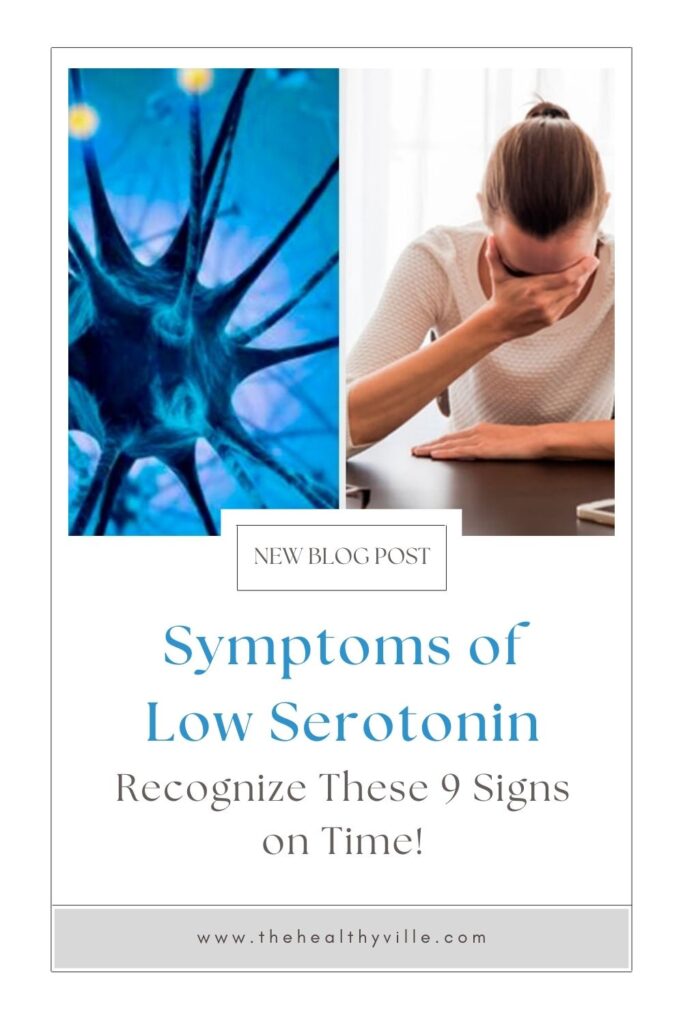Symptoms of low serotonin are important for you to recognize on time, as they can lead to several health complications. Discover 9 signs!
Low levels of serotonin can cause mental health changes such as sadness, depression, irritability, sleep problems, and aggressiveness.
Having a low level of serotonin in the body translates into discomfort ranging from mood swings to digestive and cardiac symptoms. This neurotransmitter, as detailed in a publication in the National Center for Biotechnology Information, is involved in the regulation of behavior, memory and various physiological functions.
Therefore, when its levels decrease, the body undergoes changes that manifest with physical and emotional discomfort. Thus, sadness, irritability, lack of concentration, sleep disorders, among others, may indicate that their levels are low. Do you want to know more about it? Keep reading!
What is serotonin?
Serotonin is a chemical produced by nerve cells. It acts as a neurotransmitter and its main function is to modulate neuronal activity and a wide variety of neuropsychological processes. Likewise, and according to what was disclosed in the Annual Review of Medicine, it intervenes in biological functions such as the following:
- Cardiovascular function.
- Gut motility.
- Ejaculatory latency.
- Bladder control.
Most serotonin is found outside the central nervous system, such as in the digestive system and blood platelets. In addition, it is made of an amino acid called tryptophan, which is obtained through foods such as nuts, cheeses, and meats. If there are low levels of tryptophan, it also tends to lower serotonin. Consequently, the body experiences physical and psychological symptoms.
Main functions
Being a neurotransmitter, the main function of serotonin is to carry messages from one area of the brain to another. Thus, it intervenes both in emotions and in cognitive functions and motor skills. In particular, it affects the following processes and functions:
- Control depression and anxiety.
- Increase the feeling of well-being.
- Stimulate wound healing.
- Promote nausea.
- Maintain bone health.
- Control bowel movements and their function.
- Stimulate the parts of the brain that control sleep and wakefulness.
- Influence sexual function.
Symptoms of low serotonin levels
Sometimes, the imbalances that the body suffers are associated with a decrease in serotonin levels. Of course, it is a situation that must be determined by a doctor or specialist. Even so, it is convenient to know some symptoms that can help detect it in a timely manner. Take note!
-
Mood disorders
Studies suggest that low serotonin levels play a role in increased anxiety. This is because this substance largely regulates impulses and emotions. In this sense, its decrease is also linked to the following disorders:
- Depression.
- Panic.
- Generalized anxiety.
- Obsessive compulsive disorder (OCD).
-
Digestive problems
95% of this hormone is produced within the intestine. Due to this, the deficiency of this hormone directly affects the gastrointestinal processes, to the point of developing an irritable bowel syndrome. However, by increasing the levels of said hormone, it is possible to control this condition.
-
Cognitive impairment
Beyond its impact on mood, serotonin affects relevant cognitive processes such as memory. Thus, as a study in Translational Neuroscience shows, its low levels due to diseases such as Alzheimer’s and schizophrenia.
-
Need to eat carbohydrates
If a person has low serotonin, it is normal for his body to try to compensate by eating carbohydrates and sweets. These foods help increase the levels of this neurotransmitter in the brain. For that reason, the person experiences a lot of satisfaction when eating foods full of sugar.
-
Fatigue
When serotonin levels are lower, energy decreases and fatigue sets in. It is usual for people who suffer from it to have a sensation of:
- Apathy.
- Lethargy.
- Fatigue.
- Lack of motivation.
- A constant feeling of fatigue and weakness can alert the decrease in serotonin.
-
Libido
Uncontrolled serotonin levels have a negative impact on libido. Although its decrease is usually in association with a greater sexual desire, it also reduces the ability to connect emotionally with the partner, which translates into unsatisfactory relationships.
-
Difficulty falling asleep
A low level of serotonin affects the appearance of sleep disorders. As a study in Sleep Medicine Reviews explains, serotonergic neurotransmission plays an important role in modulating circadian rhythm, sleep, and wakefulness. Therefore, if the hormone decreases, the following symptoms occur:
- Insomnia.
- Constant nightmares.
- Inability to relax.
- Sleeping problems.
- Difficulty getting a deep sleep.
- Trouble staying asleep at night.
-
Low self-esteem
If suddenly low self-esteem, there are feelings of frustration or dissatisfaction with oneself, it is possible that a low level of serotonin is presenting. Although many ignore it, this neurotransmitter is also key to feeling well with oneself. The lack of self-esteem also manifests with comparisons, hypersensitivity to criticism, lack of confidence, among others.
-
Chronic pain
Serotonin affects the behavior of the muscles; therefore, a low level of this neurotransmitter can cause chronic pain. In fact, research in The Journal of Rheumatology explains that serum serotonin levels are lower in fibromyalgia patients. This condition characterizes by causing widespread severe pain.
Research suggests that decreased serotonin worsens chronic pain in disorders such as fibromyalgia.
Do you think you have a low serotonin level?
If you have just recognized these symptoms and believe that you have a low serotonin level, it is best to seek professional attention. The doctor, after carrying out the corresponding tests, will determine if it is necessary to consume medications (such as selective serotonin reuptake inhibitors) or if it is enough to improve the diet and lifestyle.
Of course, in case of depression and mood disorders, psychological help is also essential. Thus, it may be that the problem requires a multidisciplinary approach. Therefore, as far as possible, it is necessary to consult as soon as possible.
Don’t forget to SHARE the symptoms of low serotonin with your friends and family on your social networks!

